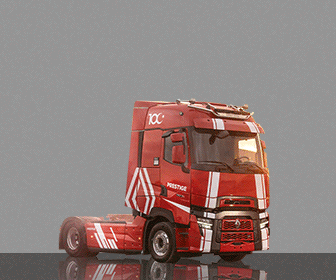
Britain, Spain and Belgium top the past year’s sales statistics for Volvo’s hybrid buses. These hybrid models, which are up to 39 per cent more fuel-efficient than corresponding diesel buses, have since 2010 recorded sales and orders of more than 4,000 units from customers in 23 countries.
Volvo’s hybrid buses are what you call full-hybrids, which means that they run entirely without exhaust emissions, powered by electricity from standstill up to 20 km/h, and also when the bus is at a standstill at the bus stop. Above this speed, propulsion is provided by a small diesel engine. Fuel consumption and CO2 emissions are up to 39 per cent lower than for a comparable diesel bus.
Unlike plug-in hybrids and all-electric buses, Volvo’s hybrid buses require no special infrastructure. Their batteries are charged on board the vehicle using the energy generated by engine braking. This means that hybrid buses can be used on any bus route both in inner-city operations and in the suburbs. From the viewpoint of capacity too, it offers considerable flexibility. Volvo’s hybrid buses are available in conventional 12-metre configuration, as articulated buses, and as double deckers.
“At the same time as our sales of electric hybrids and all-electric buses are rising, we are also seeing continued stable demand for our hybrid models. The combination of electric propulsion at low speeds and at bus stops, good energy efficiency and considerable flexibility makes them a particularly attractive alternative to both small and large cities,” says Marie Carlsson, Director e-mobility Solutions Europe at Volvo Buses.
Volvo’s biggest single market for hybrid buses is Britain, which accounts for almost half of total sales. Over the past few years demand has seen a significant increase in several countries, particularly in Belgium and Spain. Customers on the Spanish market have invested in a total of more than 300 hybrid buses from Volvo, of which 120 in the past year alone. In Sweden Volvo Buses has sold more than 200 hybrid buses to cities such as Gothenburg, Sundsvall, Nässjö, Värnamo and Kungsbacka.
Between January 1, 2018 and April 1, 2019 the number of sold and ordered hybrid buses totalled 817 units.

Volvo’s range of electrified buses
Hybrid buses: Volvo 7900 Hybrid, Volvo 7900 Hybrid Articulated, Volvo Hybrid Double Decker. Hybrid buses powered by electricity from standstill and when at the bus stop, otherwise propelled by a diesel engine. Hybrid buses equipped with batteries and an electric motor and a small diesel engine. The batteries are charged during engine braking, and the bus requires no charging infrastructure. Up to 39 per cent more energy-efficient than a corresponding diesel bus.
Electric hybrids: Volvo 7900 Electric Hybrid, Volvo Electric Hybrid Double Decker (B5LHC). Electric hybrid buses powered by electricity for most of the route. Equipped with batteries, an electric motor and a small diesel engine. The batteries are charged both during engine braking and via fast Opportunity Charging at either end of the route. Up to 60 per cent more energy-efficient than a corresponding diesel bus.
Electric buses: Volvo 7900 Electric. Electric buses propelled entirely by electricity. These buses have a powerful battery pack and electric motor. The batteries are charged via engine braking and through fast Opportunity Charging at either end of the route or via CCS cable in the depot. Up to 80 per cent more energy-efficient than a corresponding diesel bus.



